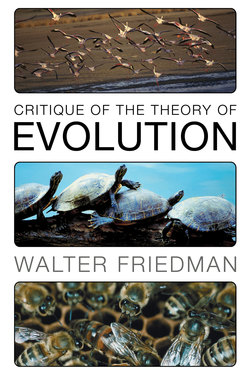Читать книгу Critique of the Theory of Evolution - Walter Friedman - Страница 17
На сайте Литреса книга снята с продажи.
11 : Second-Generation Evolutionists
ОглавлениеThe second generation of evolutionists did not like one bit what the first generation did to their beloved theory, so they came up with ideas of their own. As a result, they were able to discard the ideas of vital force, “nature magic,” astrology, and all other unscientific garbage. But in the process they created an equally large mess.
Initially, the second generation stated that the creation of the original cell was a random event and, because of this randomness, cannot be reproduced.
In order to proceed with the discussion, we will need to define the word random. This is how Webster’s New World Dictionary defines it: “without careful choice, aim, plan, etc.; lacking aim and method.” Nothing in this definition suggests that a random event is necessarily a one-time event.
Science indeed deals with random events; for example, the landing of an electron on a laboratory screen is a random event in the sense that determination of the exact landing spot is impossible. However, it is possible to calculate the probability of the electron hitting any given spot based on the position of the screen and the electron gun.
Does any branch of science deal with one-time events that cannot be reproduced? The answer is a categorical NO—all scientific theories deal with events that can be reproduced numerous times, otherwise there would be no difference between science and unscientific speculation.
Evolutionists tried to bypass this methodological difficulty by saying that the big bang was also a one-time event that, nevertheless, forms the basis of all cosmological theories.
Let’s take a look at an alternative to the big bang theory. If the big bang never occurred, then it follows that the universe always existed. But the notion of a universe that has no beginning runs contrary to all known cosmological data, such as the expansion of the universe, background radiation, etc. On the other hand, the data that would prove that any alternative to the evolutionary theory is incorrect does not exist.
Some evolutionists tried to remedy the situation by asserting the following proposition: at the present time we do not know what kind of biochemical reaction led to the creation of the original cell; however, in the future, scientists will be able to reproduce it and understand why the reaction is extremely rare. But in this case the evolutionary theory is not really a theory but a hypothesis and should be classified as such. This is how Webster’s New World Dictionary defines hypothesis: “an unproven theory, proposition, supposition, etc., tentatively accepted to explain certain facts or provide a basis for further investigation.” But evolutionists demand complete and immediate acceptance of their ridiculous theory.
Recently an evolutionist proposed that there was more than one original cell; perhaps they came to be in different geological epochs. Although a vast majority of evolutionists disagree with it, this proposition deserves a close look.
If the proposition is correct, then there are two distinct possibilities: 1) All original cells lead to identical evolutionary lines. This is clearly absurd: if this proposition is correct, then dinosaurs, for example, would still be roaming around. 2) The original cells lead to different evolutionary lines. In this case, the number of original cells is impossible to determine and it is also impossible in principle to make classifications of species based on the evolutionary lines. But true science does not deal with objects that defy classification.
Now it’s the right time for the evolutionists to yell—the straw man is on fire!!
But the straw man is a creature of their own making.
